Dubai to set up chamber of commerce in Vietnam
UAE’s non-oil foreign trade increased 28 per cent in 2021 and 17 per cent in 2022. What made UAE foreign trade increase so impressively while global trade was suffering significantly?
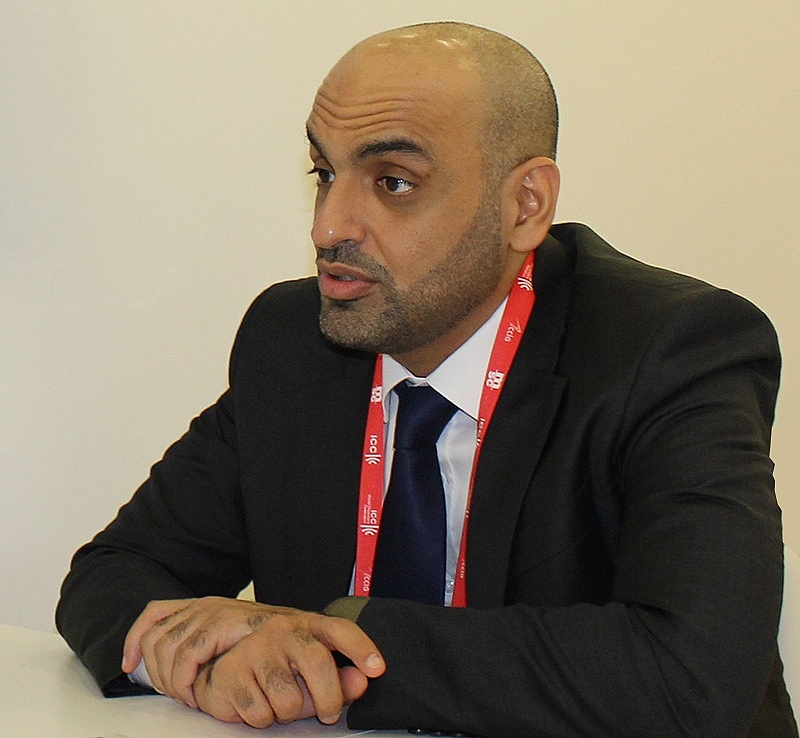 |
| Dubai Chambers’ president & CEO Mohammad Ali Rashed Lootah talked with Thuc Minh at the 13th World Chambers Congress in Geneva, Switzerland. Photo: Noah Rosa |
There are several reasons. First, we acted very fast during the pandemic outbreaks, so we reopened early. Second, a lot of relief policies and programmes were launched, increasing the friendliness and competitiveness of our business environment. I think that gave us, UAE and Dubai, big advantages to draw a lot of investments and helped new businesses to start despite the pandemic. When you have businesses remain or new ones enter the market, they need many things to (re)start.
In addition, during the pandemic, we closed for only two weeks and were very active in dialogue with partners to find ways to continue global trade. We concluded several Comprehensive Economic Partnership Agreements (CEPA) with various partners to increase foreign trade and remove both tariff and non-tariff barriers. That had a vast impact, helped increase both exports and imports.
The UAE has become a vibrant economy, and a business and tourist hub. How did you transform the oil-dependent economy into a vibrant economy over the last few decades?
We have an internal process that involves the private sector in any draft laws and policy reforms. Normally, the government reaches out to the private sector through the chambers of commerce to make sure all the laws and regulations that impact directly or indirectly on businesses are reviewed and adjusted timely. We at the Dubai Chambers get all comments by the private sector, then communicate with the government on any policy or regulation that has impacted negatively on businesses or contributed to attract foreign investments.
In 2022, for example, only through Dubai Chambers, we reviewed 81 draft laws. The average rate of adoption, or the government’s acceptance of comments from private sector, is around 60 per cent, which is very high. In certain fields, such as family business laws, it is 90 per cent. That means our government is very resilient and really listens to the private sector. That also means the private sector trusts the government, and they will continue to give their comments.
The private sector is fast moving. If they cannot move fast, they will move to other markets immediately. So, it is critical to have the policy side act fast and the involvement of all stakeholders. For certain business laws, not only businesses but also consumers, non-government organisations must be involved.
Moreover, we value innovation. We have a good culture for innovation. Innovation is not only important for companies, but also helps draw talent. That’s why Dubai is home to 199 nationalities. We have received academics from all parts of the world coming to work here because they like our innovative culture. They want their ideas to be accepted and developed. Innovation cuts across all sectors, not only in technology as some people may have thought. And what matters is how we involve all sectors and players, even small- and- medium- sized enterprises in the innovative impulse.
Can you tell us about your chambers? How are they structured?
We have gone through the process of restructuring recently. We used to be one chamber. Now we break into three. Dubai Chamber of Commerce takes care of all domestic affairs, businesses, business policy reforms, and approves all business formalities of the city. Dubai International Chamber (DIC) focuses on attracting foreign direct investments into our city and helping Dubai companies to go global to invest outside or export more. The third one is Dubai Chamber of Digital Economy that helps develop the digital technology sector and at the same time increase the digitalisation in the economy.
The DIC created in 2021 is mandated to do an initiative for “Dubai Global.” That is the network of representative offices and trade promotion officers. They focus on Southeast Asia, Africa, Latin America, apart from developed economies.
Very soon this year, we will open an office in Ho Chi Minh City. We cannot tell the specific time just yet. But in July, we will bring a business mission to Vietnam to meet with all chambers of commerce in the country and with Vietnamese companies.
Last month, we opened offices in Jakarta (Indonesia) and Singapore. We believe the ASEAN countries will continue to grow, and we should do more business and investment in the region.
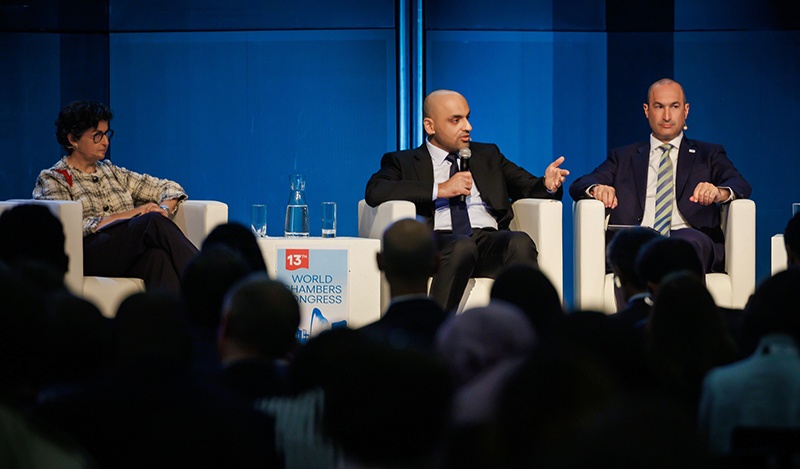 |
| Dubai Chambers’ president & CEO Mohammad Ali Rashed Lootah. Photo: Marc Bader |
That is good news. It means that you have found strong potential in Vietnam?
Vietnam is very important to us, not only within the Southeast Asian region. We have witnessed Vietnam achieving continuous GDP growth year by year over the last 10 years. We at the Dubai Chambers always like to identify which partners to concentrate on.
The UAE and Vietnam enjoy strong bilateral ties and we expect trade and economic relations to further grow following the recent joint declaration of intent to launch talks on establishing a CEPA between the two countries.
There is a great opportunity for forward-looking Vietnamese businesses to benefit from Dubai’s vast potential for trade and investment. Similarly, Dubai businesses can benefit from investing in Vietnam, especially through export and re-export.
Dubai is the most connected to the African continent. DP World (Dubai multinational logistics company) manages 25 ports in Africa. Emirates is the most connected airline in Africa. And there is a historical global treaty between Dubai and the continent. So, what we can offer to Vietnamese companies is through Dubai to go global.
As Vietnam is among our top 10 exporters into Dubai, we believe that by having our physical office there, we not only encourage Dubai’s big companies to go to Vietnam but also to encourage even more Vietnamese companies to take advantage of what Dubai can offer.
It’s essential for us to ensure our office in Vietnam, once set up, to be very active. We will focus on outcomes with clear targets, for instance how many Vietnamese companies we have to attract and help grow, and how many Dubai companies go to Vietnam to spot investments. Based on the targets, we can measure success or learn from the areas of development and continue improvement.
What sectors or industries have potential for Vietnam and Dubai to develop more?
There are two main areas. The first one we concentrate on is attracting digital technology startups from Vietnam. We have big events that take place in Dubai, such as the Expand North Star Summit organised yearly in October. Last year, this event hosted 800 tech-startups from more than 100 countries and over 600 venture capital funds. This year, it will be made even bigger. That’s an opportunity for Vietnamese tech-startups to go to Dubai, showcasing their products and services to get funding.
The second one focuses on traditional sectors. We know that Vietnam is strong in manufacturing. How can we help more Vietnamese products to go from Dubai to neighbouring regions like Africa, Middle East and Central Asia? Starting from last year, we have seen a lot of fruits coming from Vietnam. How can we increase the volume? We are happy to do that.
Products of high potential for growth in exports from Vietnam to Dubai include coffee, tropical fruits, furniture, and cashew nuts.
On the other side, we want to bring into Vietnamese market more products from Dubai and Africa such as spices, perfumes, and sausages, sustainably and more affordably. With the connectivity and logistics infrastructure we have, we are sure we can supply goods from our regions at very competitive prices.
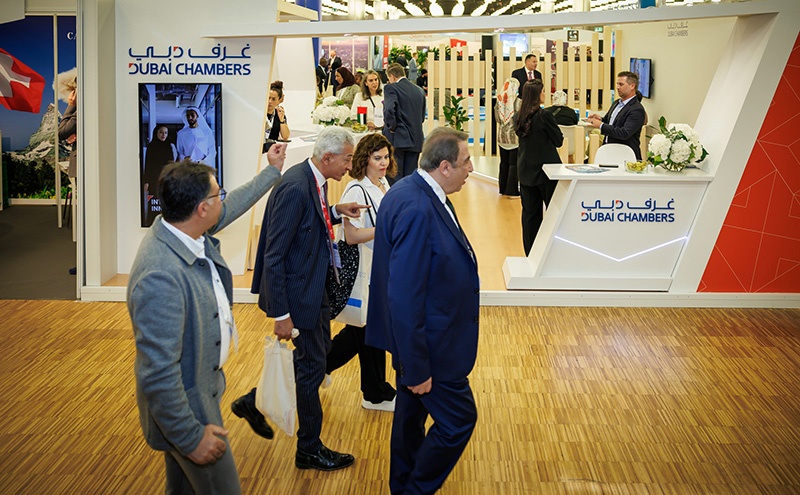 |
| Dubai Chambers’ flashy booth at the 13th World Chambers Congress attracted many visitors. Photo: Marc Bader |
A common belief among businesses Vietnam is that Dubai is a financial hub where investment funds are abundant. How can they be accessible for Vietnamese companies?
I invite Vietnamese tech-startups to come to Dubai this October to join the event I mentioned earlier. Last year, the funds awarded to startups at the event reached nearly $500 million. It’s also worth mentioning that about 40 per cent of funds for startups in the Middle East region came to Dubai last year. That is therefore an ample opportunity for Vietnamese startups.
What about funds for other sectors such as infrastructure or agriculture?
Technology is crucial to us. But that doesn’t mean we don’t consider projects in other sectors. It’s important to show us projects with a comprehensive profile, clarity on the terms and conditions and all requirements. We at Dubai Chambers can do the connectivity. If there are such project proposals, they can be communicated through us, then we can inform interested parties in Dubai.
There is great potential for investments in sectors of mutual interest, including industry, energy, logistics, agriculture, technology, and infrastructure. High potential sectors for investment in Vietnam include agribusiness, construction, ecotourism, and food processing.
With Dubai’s new Economic Agenda (known as D33), which aims to double the size of Dubai's economy by 2033, our outlook for stronger ties with Vietnam is very positive as both sides can leverage one another’s strategic partnerships and agreements.
| Vietnam-Dubai economic relations in numbers - In 2022, Dubai's total non-oil exports to Vietnam reached $309 million, while imports from Vietnam recorded $7.37 billion. - Dubai’s 2022 main exported and re-exported products to Vietnam included tobacco ($92 million), animal fodder ($38 million) and aluminium ($33 million), as well as perfumes and cosmetics, machinery, plastics, iron and steel, mineral fuels and bituminous, and medical instruments. - Meanwhile, Dubai imported from Vietnam electronics ($5.15 billion), footwear ($564 million) and machinery ($375 million), as well as knitted articles, inorganic chemicals, apparel, fruits and nuts, coffee, tea and spices, furniture, and leather articles. - As of May 31, 2023, a total of 170 members from Vietnam signed up with the Dubai Chamber of Commerce, with 22 of them having registered between January and May 2023. Source: Dubai Chambers
|
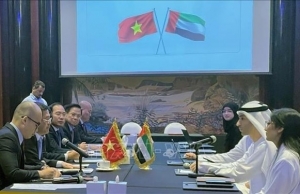 | Vietnam, UAE to soon kick off negotiations of comprehensive economic partnership agreement Minister of Industry and Trade Nguyen Hong Dien and Minister of State for Foreign Trade Thani bin Ahmed Al Zeyoudi of the United Arab Emirates (UAE) have signed a Ministerial Declaration on starting negotiations on a comprehensive economic partnership agreement (CEPA) between the two nations right after Vietnam completed its procedures. |
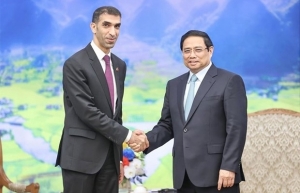 | PM calls for early finalisation of Comprehensive Economic Partnership Agreement with UAE Prime Minister Pham Minh Chinh received Minister of State for Foreign Trade Thani bin Ahmed Al Zeyoudi of the United Arab Emirates (UAE) in Hanoi on June 5, calling on the UAE to work closely with the Vietnamese Ministry of Industry and Trade to soon finalise talks on the bilateral Comprehensive Economic Partnership Agreement (CEPA). |
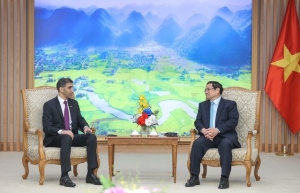 | Investment and new labour tie-ups lead UAE negotiations An upcoming economic cooperation deal between Vietnam and the United Arab Emirates will help both economies to beef up investment flows and trade ties. |
What the stars mean:
★ Poor ★ ★ Promising ★★★ Good ★★★★ Very good ★★★★★ Exceptional
Related Contents
Latest News
More News
- Vietnam-South Africa strategic partnership boosts business links (February 06, 2026 | 13:28)
- Mondelez Kinh Do renews the spirit of togetherness (February 06, 2026 | 09:35)
- Seafood exports rise in January (February 05, 2026 | 17:31)
- Accelerating digitalisation of air traffic services in Vietnam (February 05, 2026 | 17:30)
- Ekko raises $4.2 million to improve employee retention and financial wellbeing (February 05, 2026 | 17:28)
- Dassault Systèmes and Nvidia to build platform powering virtual twins (February 04, 2026 | 08:00)
- The PAN Group acquires $56 million in after-tax profit in 2025 (February 03, 2026 | 13:06)
- Young entrepreneurs community to accelerate admin reform (February 03, 2026 | 13:04)
- Spring Fair 2026 launches national fair series (January 30, 2026 | 16:17)
- SnP celebrates 10th anniversary with new brand identity (January 30, 2026 | 14:41)

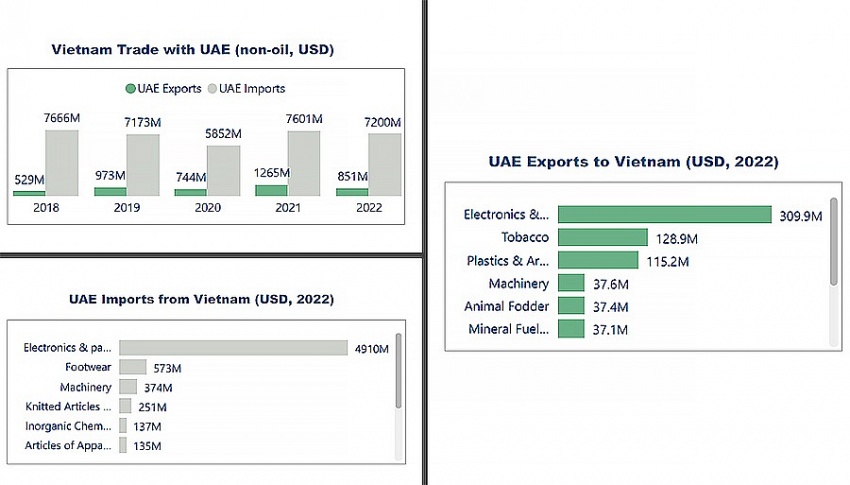
 Tag:
Tag:




















 Mobile Version
Mobile Version